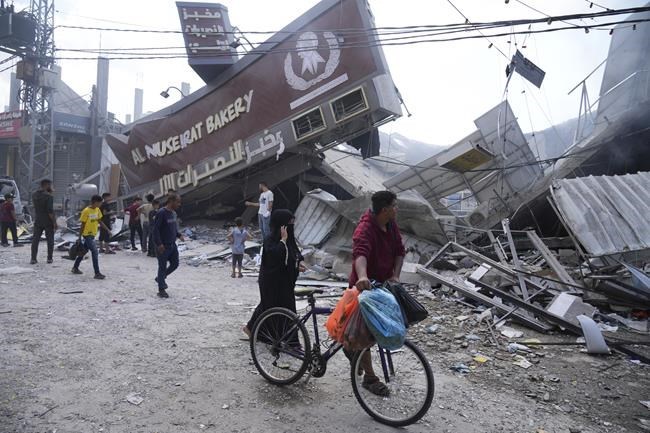For Mansour Shouman, a Canadian in the Gaza Strip, a blast at a hospital that was said to have killed hundreds has deepened fear among Palestinians in the territory under constant bombardment, and convinced residents that nowhere is safe.
Shouman, 39, who worked as a consultant for the gas and oil industry in Calgary, relocated to the Middle East in 2006 with his five children and wife.
He said Palestinians in Gaza have been living in stunned disbelief since Tuesday's blast at a Gaza City hospital, which caused carnage that has fuelled anger worldwide.
There were conflicting reports of who was responsible for the explosion at the hospital. Officials in Gaza have blamed an Israeli strike. Israel has denied involvement and released evidence it says shows the blast was caused by rocket misfire from militants in Gaza.
Shouman said that some Palestinians who had been sheltering at Gaza hospitals have decided to relocate following the explosion, moving to a United Nations school, a relative's home or the streets.
Others, like him, have decided to remain at hospitals.
"If it's meant for us to die in a hospital bombing, so be it. We will die with our heads up high, holding steadfast in our grounds," said Shouman, as he sat under a tent in a hospital complex in the southern Palestinian city of Khan Yunis.
With Gaza sealed off from humanitarian aid, Shouman said Palestinians have been sharing food and water among neighbours.
Israel shut off all supplies to the besieged territory soon after Hamas militants rampaged across communities in southern Israel on Oct. 7, killing soldiers and civilians, including children.
"Some people in Gaza went through four or five wars so they always have a precautionary food inventory in their houses, however...the burden has increased given the increased number of people and children that they have to feed," Shouman said.
He said he has been separated from his family since Israel ordered an evacuation of northern Gaza ahead of an expected ground invasion.
He has tried to help in any way he can, removing survivors trapped under destroyed buildings or talking to media to raise awareness.
"I'm just trying to channel my disappointment and anger to action...because if you just sit idle, doing nothing given what you're seeing, hearing and feeling around you, you might go mad," he said.
Speaking from London, Ont., Moayed Salim voiced desperation as he described relatives trapped in Gaza and facing starvation.
He said his 66-year-old Canadian father -- who was born in Gaza and moved back to the Strip last year -- is running out of water.
Salim, 33, said another relative told him that a nearby bakery that was her only source of food was bombed on Tuesday night.
"She also saw two men at each other's throats, about to kill each other for bottles of water," he said.
The office of Israeli Prime Minister Benjamin Netanyahu said Wednesday that limited humanitarian aid will be allowed into Gaza following a request from U.S. President Joe Biden, who was in the region.
Salim said his father feels he could die at any moment, but hopes to survive and meet his new grandson once he's born.
"It will be a miracle if they can survive this," Salim said.
Salim said his father is among the Canadians who have registered with the embassy in Israel, seeking help to evacuate. Global Affairs Canada said Tuesday it knows of 370 people in the territory. That includes Canadian citizens, permanent residents, and their families.
Shouman said although he initially wanted to leave Gaza after the outbreak of the Israel-Hamas war, he now wants to get his family out but stay behind to help.
"I cannot leave the people here. I need to stay with them until this ends and we rebuild Gaza again," he said.
This report by The Canadian Press was first published Oct. 18, 2023.
The Canadian Press



